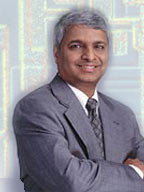The Rediff US Interview/ Dr Gururaj Deshpande


Dr Gururaj 'Desh' Deshpande, the second richest Indian billionaire, and founder of the US-based Sycamore Networks, one of the hottest IT scrips even on the battered Nasdaq, is not
unduly perturbed over the gloom gripping Silicon Valley, thanks to the meltdown in
the US economy.
Having pioneered next-generation optical networking technology products to revolutionize the
backbone of the public network system, Dr Deshpande has every reason to be upbeat
about the future of convergence technologies, driven by the all-pervasive Internet, which,
he says, will survive the gloom only to bloom later; maybe by the year-end!
Not one to rest on his laurels or the popularity ratings his $ 200 million start-up has received over the last two years as one among the Top 100 companies of the Electronic Economy by Red Herring, or the Top 10 Picks by Fortune, Dr Deshpande turned to his native state (Karnataka), and India's own Silicon Valley (Bangalore) to co-found a technology start-up, Tejas Networks, for rolling out its first intelligent optical access product for the global market, within 9 months of floating it with venture capital.
In an interview with Fakir Chand, the 52-year-old Desh (as he is
fondly known and called) shared his views on emerging technologies, the dotcom failure,
and the shape of things to come.
Could you give us an update on the tech front in the US?
The hitech industry in the US has gone through one of the biggest build-ups during the last
3, 4 years, and the core of such a build-up has been the Internet, which has not only
revolutionized the art of communications, transactions, and exchange of information (read
knowledge), but also rendered the world into a global village, just a click away.
It is no wonder then that the kind of valuations Internet companies got over the last couple
of years is obviously baffling, if not mind-boggling. A lot of people out there thought that if you
could have a web site or a portal overnight and get enough eyeballs, you could build a world
class business. What's more, Wall Street went to fund lots of such ventures in the dotcom
world.
In a year or so, unfortunately, those very people, who went to launch a dime-a-dozen start-ups,
dotcoms, and B2B or B2C sites have began to realize nervously that it may not be possible to
convert all the eyeballs their web sites were getting for the asking into profits. The bubble began
to get pricked for the Internet to go bust, sooner than later. But there is hope as everything is
not over yet in the land of El Dorado.
What is the impact of the beating tech stocks took on Wall Street?
A lot of gloom and doom has set in the technology industry as its nervous proponents took a drubbing on the bourses, taking a heavy toll of the meltdown in the US economy in general.
As a consequence of their valuations going for a toss, fresh capital or another round of funding
started drying up. The same thing is happening even in the carrier business as there was lot of
hype and build up with many start-ups coming up suddenly from nowhere and hitting the
market with hefty valuations for plenty of funds.
Here too, valuations were based on the number of subscribers they got quickly while the going
was good, and continued to build up a huge customer base. As a result, they too managed to
raise a lot of money. But, as is their wont, many of them did not have a good business or
revenue model to convert their huge customer base into profits as most of their subscribers got
connected with a lot of freebies.
How do you view these developments on the tech front, and on the economy as a whole?
It is a fact that there has been a lot of over investment in the new economy, and as a result
of which, even Wall Street began to react nervously during the last two quarters. In the old
economy, if you look at some of its good old companies, which commenced operations, say
30, 40 years ago, they were built for only long-term returns, keeping in view the 15 ,20 year time gap
for sustained growth and consistent profits year after year.
They first had a world class product, built a global market, made profits, and only then went to
Wall Street to raise funds with strong valuations. But this time, Wall Street got pretty
much innovative creating a revolutionary opportunity for the plethora of companies, including
start-ups to raise funds for the asking.
Not to be outdone or left behind, angel investors and venture capital funds with deep pockets
were only too glad to queue up for splurging their investments to anyone who claimed to have a
great idea and a great product. The name of the game has been: "I am gonna give you the money,
go and build a company and I know you will make money with lot of profits to boot." Sometimes,
the gamble pays off, and at other times it fails to do so.
Is there a future then for New Economy companies?
Why not! The good news about companies of the New Economy is that during the last 3, 4
years the hitech industry has done much more than what all the companies of the old economy
would have probably accomplished over the last 20 years or so. Literally, there has been a
vertical growth in the New Economy as against the linear growth witnessed by companies of
the old economy. The reason is the rush of investments backing the new ones.
Another thing that brought about such a sea change is the globalization of the world economy
by the Internet, which is also playing a crucial role in integrating the people, communities,
countries, trade, business, etc, but also driving the markets round the clock on real-time basis.
You want to know what next? Well, the hitech industry will also go through a couple of
attritions. There is nothing unusual about it because these things happened earlier too in the
case of television, radio, and other sectors of the old economy spread over the decades of the last
century.
Since our memories are short-lived, experts and historians are aware that television industry
went through 30 years of attritions, and radio took another 20 years of cyclical ups and downs.
A lot more economies went through a few such attritions before they actually found out how to
make money of their businesses. The dotcom world will also have to go through this kind of
attrition. It is good for it. It is good for all of us in the tech sector.
There is no cause for worrying too much because, I repeat, because the Internet is here to stay
for a long, long time to come. Converging technologies and integration of the world economies
will globalize the markets of each country.
If you look at it from the short-term, until you figure out all that stuff, the turbulence being
witnessed all around is for real. And those who do not recognize it in time should be na´ve about
the marketplace. But if you look at it from a long-term perspective, there is absolutely no
problem because the Internet, you see, will play a huge role in the global economy. It has the
ability to reach out the entire world and connect everybody as never before, and as no other
technology that too at such an affordable cost with such a penetration.
How real is the Internet in our lives?
A lot. It makes everything more productive. Companies will be much better, lean, mean, and
qualitative. People are ready to invest a lot more in the Internet. Increasingly, everything will
revolve around the web. It is a different matter that India has probably underinvested in either
products or future technologies.
What prompted you to co-found Tejas Networks in India?
Though I am an Indian and come here once a year, I have never done business in India. I have
watched N R Narayana Murthy (the Infosys chairman is his brother-in-law; they are married to sisters) closely to study how he built a global IT company in a span of 15
years. You can call it an inspiration and an invitation to do something similar. That is how I am
here now with Tejas.
Our gameplan was to gather a group of brilliant techies, build a company in India and make
world class products for global markets. We want to set a trend in the optical networking
products market, and emerge as a leader in the Asia-Pacific region, which is on the growing
curve for a long time to come.
Instead of setting up a subsidiary of Sycamore, as most US-based tech companies tend to
do, we have decided to set up a start-up with overseas funds to roll out products and not offer
merely software services or consulting.
Tejas is also the business partner of Sycamore and responsible for the latter's sales and
marketing of optical networking products in India and the Asia-Pacific region.
Tejas was essentially set up with two goals in mind. One, to allow India to build some of the
networks that the country needs so urgently in spite of bandwidth constraints, and to develop
'made in India' products for the global market. For making it a success story, we have all the
three things: Talent, funds, and global customers..
Design: Uttam Ghosh
EARLIER INTERVIEWS:
'There are lots of things money cannot buy'
'India has to move away from the
mentality of a developing country'
EXTERNAL LINKS:
How Desh became the richest Indian
Deshpande, Gururaj, E on Forbes 400 US Richest
From Financial Flop to Billionaire
Back to top
Tell us what you think of this interview